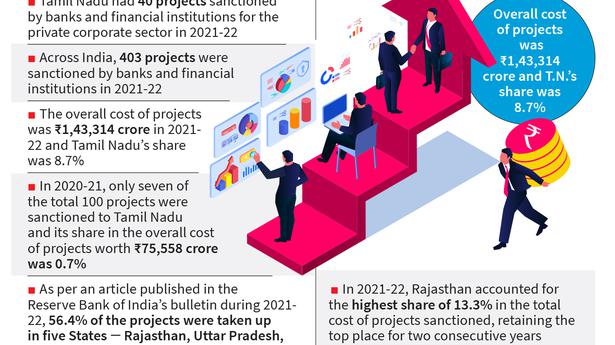
Good investment climate boosts project financing
The Hindu
The State’s share in the overall project cost of ₹1,43,314 crore sanctioned by banks and financial institutions increased to 8.7% in 2021-22 from just 0.7% of ₹75,558 crore in 2020-21
An improved investment climate and economic recovery after the COVID-19 pandemic have boosted financing for private sector projects in Tamil Nadu by 8% over the past year. The State’s share in the total cost of private corporate sector projects sanctioned by banks and financial institutions has significantly improved in 2021-22. Tamil Nadu’s share in the overall project cost of ₹1,43,314 crore sanctioned by banks and financial institutions increased to 8.7% in 2021-22 from just 0.7% of the overall project cost of ₹75,558 crore in 2020-21. The State’s share from 2012-13 to 2019-20 had stood at 6.4%.
According to an article, ‘Private Corporate Investment: Growth in 2021-22 and Outlook for 2022-23’, published recently in the Reserve Bank of India bulletin, Rajasthan accounted for the highest share, in total cost of projects sanctioned by banks and financial institutions at 13.3%, in 2021-22. Even though its share declined from 17.1% in 2020-21, it retained the top place for two consecutive years.
As the article points out, capital expenditure (capex) of the private corporate sector plays a significant role in driving the overall investment climate. With the resumption of business activities and improving demand, the announcement of new projects, especially infrastructure projects, increased significantly during 2021-22.
“The increase in Tamil Nadu’s share in private corporate investment last year is encouraging. The State government has taken several steps in recent months to revive the investment climate,” said Vidya Mahambare, professor of economics, Great Lakes Institute of Management. However, “it is important to ensure that the projects under the recently signed memoranda of understanding, worth over ₹1.4 trillion and with a focus on tech and skill-based industries, such as semiconductors, renewable energy, and electrical vehicles, remain on track for implementation”.
The RBI article noted that after a setback during the pandemic, announcements of new investment projects (in the country) increased significantly during 2021-22, with the total cost recording an increase of about 90% over 2020-21, but still remaining below the pre-pandemic level. Infrastructure continued to attract maximum capex projects, led by the power and road and bridges sectors. Reflecting the policy initiatives of the government, investment in renewable energy is gaining traction over the years, the article said.
Ms. Mahambare said Tamil Nadu needs to be cautious of environmental degradation and pollution while implementing its ambitious investment plans. It also needs to figure out a solution to mounting power subsidies and raise the State’s own tax revenue (the government recently hiked power tariff). “Overall, however, the government has been moving in the right direction.”
The study does seem to indicate positive signs for Tamil Nadu because both in terms of number of projects as well as the percentage share, it has gone up significantly, said professor Lakshmi Kumar, Dean, IFMR GSB at Krea University.













